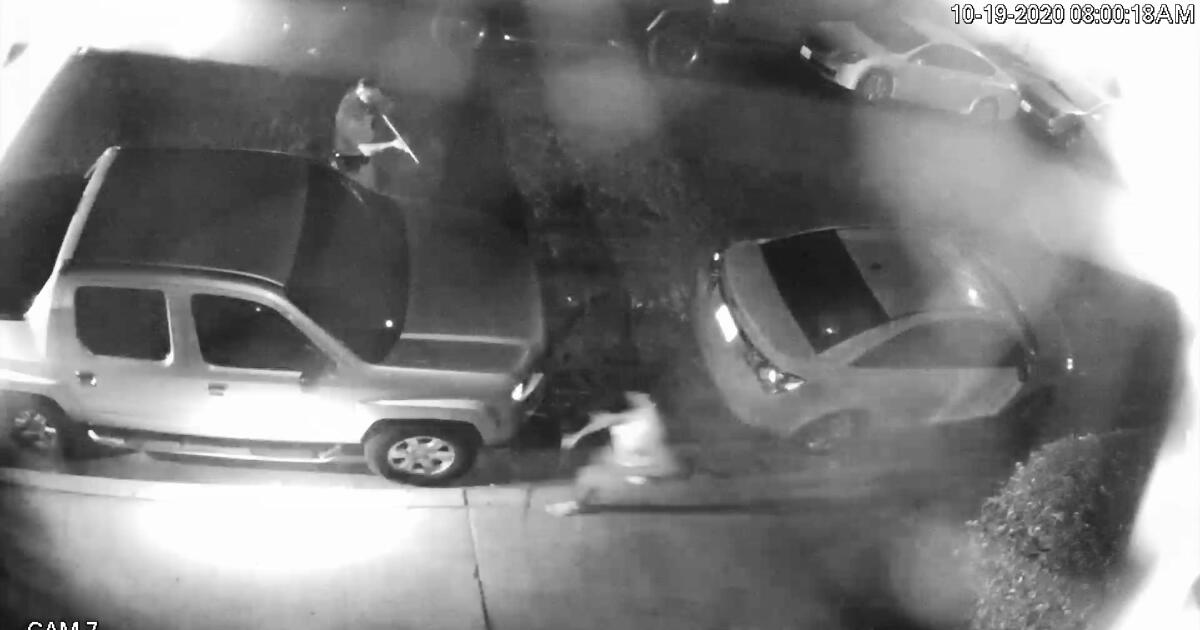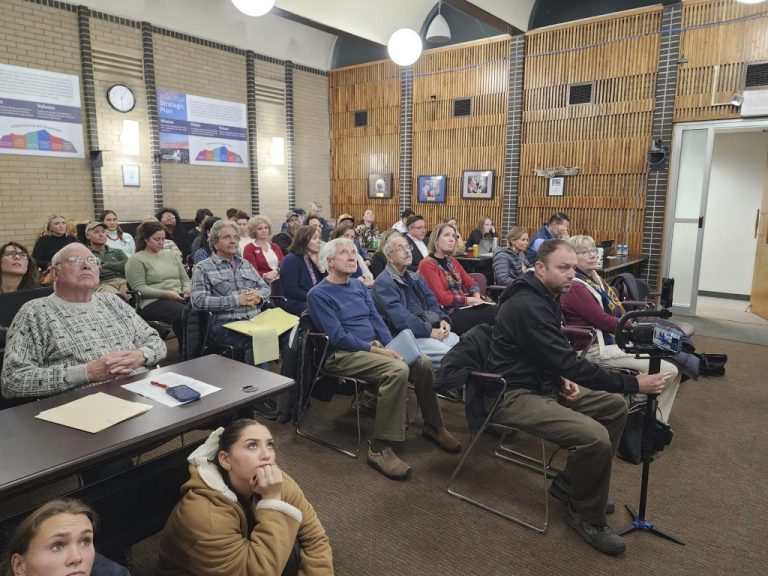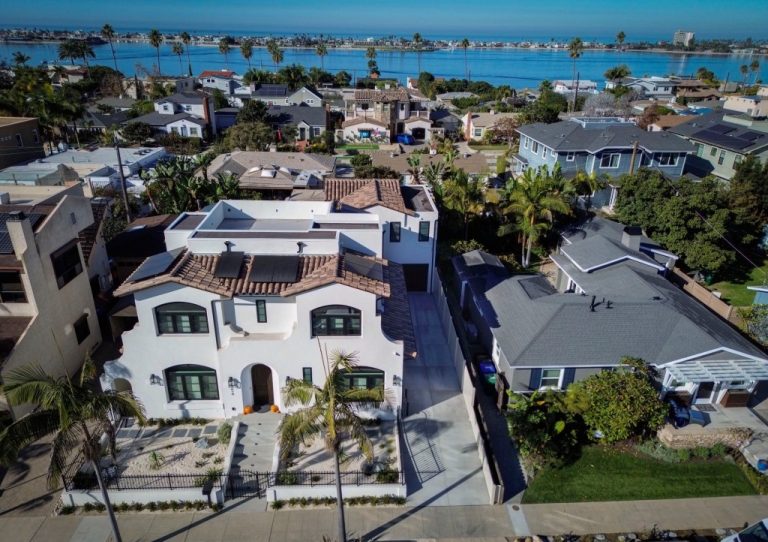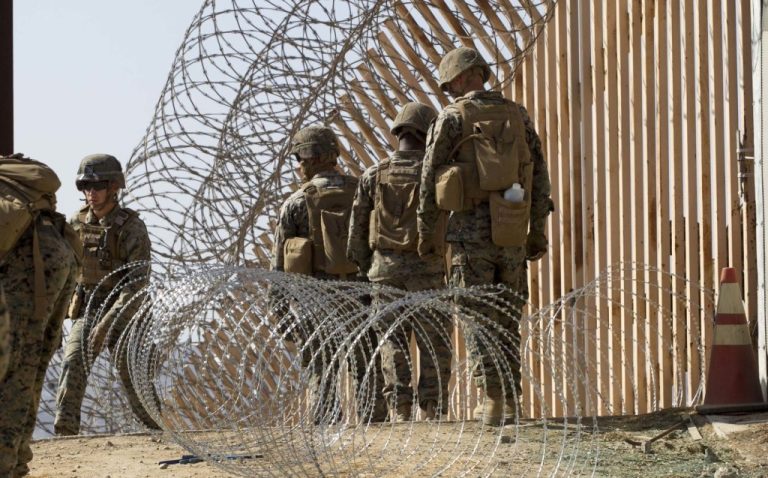
The widow of a Mexican man who was in the midst of a mental health crisis when a San Diego police officer fatally shot him in 2020 urged city leaders on Friday to do more to help people experiencing mental health emergencies.
The City Council voted unanimously last week to pay $800,000 to settle a federal lawsuit brought by the widow, Ana Clareth Ojeda, and her two children in the death of José Alfredo Castro Gutiérrez, who was shot and killed by Officer Isai Castillo. The lawsuit had claimed excessive force, wrongful death and several actions against the city and its police leaders, including a failure to properly train and supervise officers.

Ana Clareth Ojeda Benitez, widow of José Alfredo Castro Gutiérrez, speaks to reporters Friday at the Mexican Consulate in San Diego.
(Alex Riggins/The San Diego Union-Tribune)
In settling the suit, the city and Police Department did not admit any wrongdoing. District Attorney Summer Stephan cleared Castillo of any criminal liability in June 2021.
“This is a case in which there wasn’t necessarily malice on the part of the police, but negligence,” Eugene Iredale, an attorney for the family, said in Spanish on Friday at a news conference at the Mexican Consulate in Little Italy.
Consul General of Mexico in San Diego, Carlos González Gutiérrez, said the Mexican government had closely monitored the case. Castro, 39, was a Mexican citizen who lived in San Diego working a construction job.
According to various accounts of the Oct. 19, 2020, shooting provided by police, the district attorney’s investigation and the family, Castro was experiencing a mental health crisis and had also used methamphetamine when others in the Mountain View home where he rented a room decided to call 911. At one point in the early morning, Castro grabbed a curtain rod and broke several items inside the home.
His widow previously said that Castro had a history of schizophrenia and paranoia.

Ana Ojeda and her late husband, José Alfredo Castro Gutiérrez, in an undated photo.
(Courtesy of Eugene Iredale)
Iredale presented a video Friday showing cellphone footage of Castro inside the home before he was shot. In the video, he is sweating through his shirt and paranoid that people were trying to kill him. In audio of the 911 call, Castro can be heard in the background screaming for help in Spanish.
Body-worn camera footage from the officers shows them staging down the street from the home and planning how to approach and deal with Castro. In the footage, they discuss how it appears Castro has not broken any laws, since the items he has destroyed are his own property.
The police camera footage also shows the officers discussing which ones from the group will be armed with less-than-lethal weapons, including a beanbag shotgun, and which officer will be prepared to use lethal force. That responsibility, according to Iredale, was supposed to rest with Officer Matthew Kobylarz.
But when Kobylarz and Castillo approached the home, Iredale said Castillo quickly went away from the plan, and the officers began shouting in English and Spanish for Castro to come outside. Castro ran out the front door with the curtain rod in his hand and darted toward the officers.
“Kobylarz and Castillo knew that (Castro) was holding a curtain rod because they yelled at him to ‘drop the stick,’” Iredale wrote in a court document last year. “As (Castro) ran to meet his imagined saviors, Castillo pulled out his pistol and shot twice.”
Iredale said Friday that even though Kobylarz was the officer that it was predetermined would use lethal force if necessary, he fired a Taser. Another officer fired a beanbag round.
“There were two kinds of non-lethal … force, which were entirely sufficient to control the situation, and yet there was the needless use of lethal force, and the whole situation came about because it was not properly handled,” Iredale said. “What occurred here was an act of incalculably poor judgment and negligence. And the act of panic on the part of a rookie officer.”
Castillo had been on the police force for a little under two years at the time.
A San Diego police spokesperson did not respond to a message seeking comment Friday. In a motion seeking to dismiss the lawsuit, attorneys for the city and the involved officers had claimed Castro was acting paranoid because of drug use, not a mental health emergency.
“The force used was reasonable under the totality of the circumstances,” the attorneys for the defendants argued in that motion. The case settled while the dismissal motion was still pending before the judge.
Iredale and Ojeda, Castro’s widow, said the shooting showed the importance of using trained specialists, rather than police, to deal with someone experiencing a mental health crisis. The lawsuit claimed that none of the officers at the scene called for the Psychiatric Emergency Response Team.
Iredale said the “terrible pain and irony” of the situation is that Ojeda is a psychologist in Mexicali who counsels people in crisis and could see in the videos of her husband’s last moments that he was suffering.
“I make an urgent call to the leaders in charge of crisis intervention,” Ojeda said in Spanish. “There is much to do when it comes to saving lives.”






